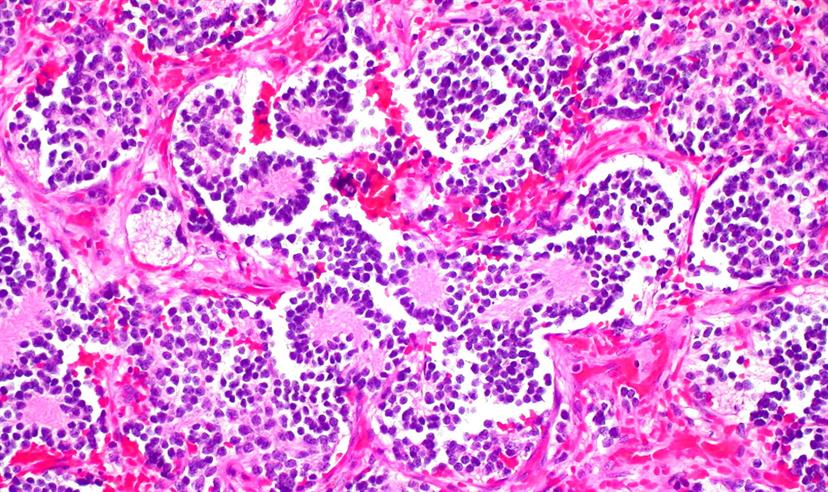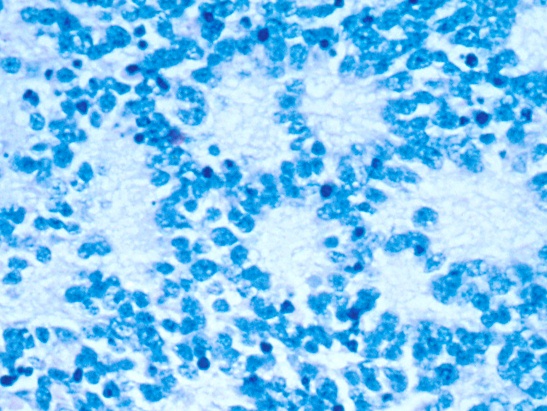
Image: Neuroblastoma of the adrenal gland provided by Ed Uthamn via Flickr licensed under CC BY-NC 2.0 license
A group of molecules, which each simultaneously target two of the most common genetic faults behind an aggressive form of childhood cancer, could lead to a potential new drug for the disease, a new study suggests.
A collaboration led by scientists at the Institute of Cancer Research, London, has discovered a number of molecules that block the activity of two proteins that encourage the growth of cells in neuroblastoma.
Neuroblastoma is a rare type of cancer that mainly affects children. Aggressive forms of the disease can be particularly hard to treat, and it remains one of the biggest killers of all childhood cancers. Children with aggressive neuroblastoma can have alteration of two genes in their cancer cells that are known to drive progression of the disease, ALK and MYCN.
The molecules, which have been reported in the Journal of Medicinal Chemistry, are the first to target these proteins in neuroblastoma simultaneously, and could lead to new treatments for this disease.
Discovering and developing drugs for childhood cancers is difficult because treatments must be rigorously tested in clinical trials. A trial of a combination of drugs can be even more challenging, so developing molecules that offer "two for one" activity can simplify the process.
Two-for-one drugs could combat treatment resistance
Targeting multiple pathways that support cancer growth and survival is also crucial to treat aggressive cancers like neuroblastoma. Drugs which block two cancer-causing proteins at the same time could prevent neuroblastoma cells developing resistance to treatment, which often leads other targeted drugs to fail.
PhD student Ellen Watts, in collaboration with ICR scientists from Professor Louis Chesler's team and the research group of Professor Stefan Knapp (Goethe University Frankfurt), developed a dual inhibitor of ALK and BRD4, a regulator of MYCN activity, by chemically modifying an existing molecule that targets BRD4 and another protein.
We greatly appreciative of the generous individuals, trusts and companies who choose to invest in the full range of our activities, from start-up costs for new research teams, to research positions, buildings, equipment and training the next generation of cancer researchers.
Altering the molecule’s chemical structure changed how strongly it inhibited different targets, and they identified promising compounds that effectively blocked ALK and BRD4 activity in neuroblastoma cells.
These molecules will now be tested in the lab to confirm that targeting ALK and BRD4 could be an effective approach for treating high-risk neuroblastoma in the clinic.
The study was supported by the Sir John Fisher Foundation, Cancer Research UK and the Structural Genomics Consortium.
'Significant step forward' for drugs to treat aggressive neuroblastoma
Lead author, PhD student Ellen Watts, said:
“Designing and developing compounds that can inhibit two structurally distinct proteins is a challenge, but this research represents a significant step forward in discovering drugs that can target two of the most common drivers of aggressive neuroblastoma.”
Leader of the study, Dr Swen Hoelder, Team Leader in Medicinal Chemistry at the ICR, said:
“We need more effective drugs for diseases like neuroblastoma but a barrier to getting them into the clinic is the difficulty of carrying out combination clinical trials in children.
“Blocking these two targets could potentially producing a stronger impact than targeting either mutation on their own. Treatments which could block both at the same time could also reduce the risk of resistance developing, a major problem for cancer treatments.”
